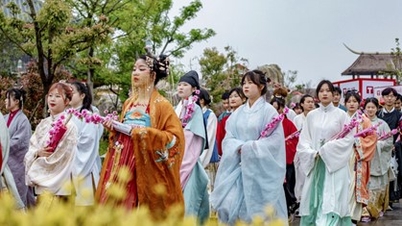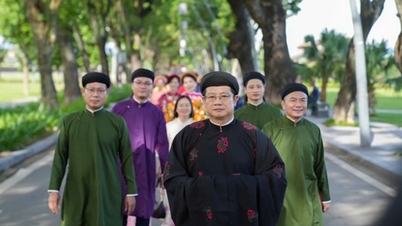Wedding receptions, engagement parties, baby showers, birthday parties, longevity celebrations, reunions, farewell parties… are occasions for hosts to express their affection to relatives, guests, friends, and acquaintances. These are indispensable activities in traditional life, especially as material living standards improve. However, this is a rather complex issue requiring a multifaceted and comprehensive approach to ensure the joyous occasion is truly meaningful, heartfelt, and creates a comfortable atmosphere for everyone involved.
My friend shared that he felt really happy, relaxed, and comfortable attending a relative's child's wedding last night... it's been a long time since he "experienced" a wedding in the true sense of the word, not the "torture" he's felt on some other occasions. Through casual conversation, I finally understood what it truly means to "have fun" at a wedding reception.
First, choose a suitable time to invite guests to a party. Lunchtime invitations on weekdays (not weekends) often create awkward situations for the invited guests. Attending a party means there's no time for a lunch break, and guests can only offer a glass of water as a toast due to work pressure in the afternoon, making it difficult to feel relaxed. In some cases, hosts invite guests whenever it's convenient for them to schedule their own events. Some rural weddings invite guests at 10 am or 4 pm, which is difficult to decide as those aren't typical mealtimes (?!). The most appropriate time to invite guests is probably in the evening, after everyone has finished a day of work; otherwise, it could be a case of "having a feast but losing out on a day's work."
After the guest reception, the ceremony should also be brief and punctual. For weddings, the ancestral worship ceremony and some procedures should usually be held for close relatives of both families before the reception. Unfortunately, some weddings take more than an hour longer than the time stated on the invitation before guests can begin the reception. Adjusting the sound and music to a moderate level will create a pleasant atmosphere for everyone. The reception is an opportunity for conversation and exchange of greetings amidst gentle instrumental music. Entertainment and entertainment should also be included, but in moderation and appropriately.
Typically, toasts are necessary at parties, but who should be the one to toasting? Perhaps this should be reserved for the host and only in necessary situations. Usually, it's appropriate for superiors or older people to invite and socialize with their subordinates. When intoxicated, some younger individuals, acting "confidently," carry their glasses around to many tables, inadvertently tapping the bottom of their glass against the rim of an older person's glass (?), when they should be toasting gently and lower than the invited person's glass. There have been instances where someone raising their glass to toast accidentally spills beer, wetting the guest's clothes – a truly comical situation. The same applies to handshakes; only older people should extend their hand first, and women are generally the ones who should initiate the handshake. This highlights the importance of proper social etiquette in public, a matter of cultural norms that cannot be taken lightly.
The number of guests at parties should also be carefully considered. Perhaps, in addition to the official party invitations, a suitable proportion should be allocated for announcements of the happy news, meaning a respectful announcement rather than an invitation to the party. Sometimes, too many guests, hot weather, loud music, and other annoying background noise can make the party unpleasant.
I've noticed that people in my hometown are more civilized now when attending parties; they pool money to rent a bus together, which saves money, ensures traffic safety, and complies with the law.
Recalling the subsidy era, when material life was scarce, the form of organizing a party was simple but imbued with genuine affection. Those invited felt honored and happy, and the host felt relaxed and at ease being welcomed in an atmosphere of shared joy and happiness. In this way, the party became meaningful and full of human warmth.
Source








































































































Comment (0)